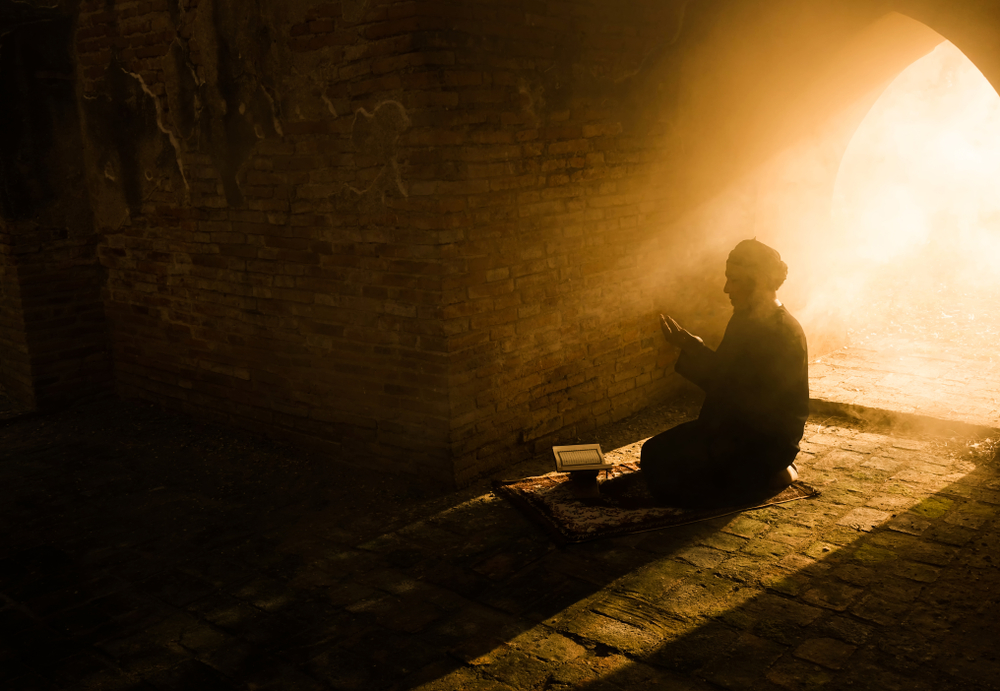Is It Permissible to Engage in Remembrance of Allah with “Hu” (He Is)?
Answered by Shaykh Faraz Rabbani
Question
This dhikr of “Hu” is used all over the world, including in Pakistan and Turkey. However, I have heard from some movements that it is forbidden and that Ibn Taymiyya himself has prohibited using the name of Allah alone or combined with a demonstrative pronoun such as “Hu”.
Answer
In the Name of Allah, the Merciful and Compassionate
I pray this finds you in the best of health and spirits.
In general, there are four principles to keep in mind regarding the remembrance of Allah Most High (dhikr):
- The call to remembrance (dhikr) in the Quran and Sunna is unconditional (mutlaq), and is therefore fulfilled by any sound statements of remembrance not contrary to Islamic principles;
- In general, the best remembrance is the remembrance of the Quran and Sunna–especially those modes encouraged by the Messenger of Allah (peace be upon him);
- However, it is clear from the practice of the Companions (sahaba), Followers (tabi‘in), Early Muslims (salaf), and the imams of the religion that other modes of remembrance are permitted without dislike;
- We recognize and accept that there is difference of opinion in the details and nuances of religious practice (furu‘), and these should not be matters of argument and dispute–especially amongst non-scholars. [Ibn Allan/Nawawi, Dalil al-Falihin ila Turuq Riyad al-Salihin; Zarruq, Sharh Hizb al-Bahr; Ibn Abidin, Radd al-Muhtar; ‘Isa, Haqa’iq]
What about Remembrance with the Pronoun “Hu”?
“Hu” (He is) is a complete, implicit sentence in Arabic–as apparent in its translation into English as “He is;” or “He is (Allah)”.
Imam Fakhr al-Din Razi and others who wrote treatises on the Divine Names included “Hu” as one of the Divine Names.
The scholars of the spiritual path found methodical benefit in the recitation of this Name (Hu) as part of spiritual practices seeking to fulfill the call of the Quran and Sunna to cultivate presence of heart (hudur) with Allah Most High. Such methodical benefits can be established through experience, on condition of soundness. [Bakhili, al-Latifa al-Mardiyya; others]
Remembrance in Your Life
In closing, I would advise four things:
- Make remembrance of Allah Most High a consistent part of your life. Strive to follow the Prophetic sunna to, “Keep your tongue moist with the remembrance of Allah.” [Tirmidhi] In your walking, work, and rest. Engage your tongue, heart, and mind with the remembrance of Allah. One way is to repeat the “lasting good deeds” the Prophet (Allah bless him and give him peace) recommended:
(1) Subhana’l Llah;
(2) Alhamdu li’l Llah;
(3) la ilaha illa’l Llah; and
(4) Allahu Akbar.
These can be recited in order or individually. Stay constant on them, and you’ll find peace of heart and increasing presence with Allah. - Strive to remember Allah Most High in your mornings (especially Fajr time) and nights (Isha and after–particularly in the depths of the night).
- Take “specific” dhikrs–such as what you asked about–only through reliable scholars, and by consulting them, especially if you intend to make them abundantly.
- Keep away from argumentation, and listening to those who argue with mainstream practices. Rather, focus on what benefits you in your relationship with Allah and in acting upon the guidance of the Quran and Sunna.
And Allah is the giver of success and facilitation.
[Shaykh] Faraz Rabbani
Shaykh Faraz Rabbani spent ten years studying with some of the leading scholars of recent times, first in Damascus, and then in Amman, Jordan. His teachers include the foremost theologian of recent times in Damascus, the late Shaykh Adib al-Kallas (may Allah have mercy on him), as well as his student Shaykh Hassan al-Hindi, one of the leading Hanafi fuqaha of the present age. He returned to Canada in 2007, where he founded SeekersGuidance in order to meet the urgent need to spread Islamic knowledge–both online and on the ground–in a reliable, relevant, inspiring, and accessible manner. He is the author of: Absolute Essentials of Islam: Faith, Prayer, and the Path of Salvation According to the Hanafi School (White Thread Press, 2004.) Since 2011, Shaykh Faraz has been named one of the 500 most influential Muslims by the Royal Islamic Strategic Studies Center.
